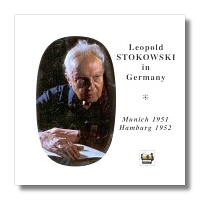
The Internet's Premier Classical Music Source
Related Links
- Latest Reviews
- More Reviews
-
By Composer
-
Collections
DVD & Blu-ray
Books
Concert Reviews
Articles/Interviews
Software
Audio
Search Amazon
Recommended Links
Site News
 CD Review
CD Review
Leopold Stokowski in Germany

Munich 1951 & Hamburg 1952
- Johannes Brahms: Symphony #2 *
- Hector Berlioz: Roman Carnival Overture
- Manuel de Falla: El Amor Brujo
- Günter Raphael: Jobonah Ballet
- Piotr Ilyitch Tchaikovsky: Symphony #5
NW German Radio Orchestra/Leopold Stokowski (7 July 1952)
* Bavarian Radio Symphony Orchestra/Leopold Stokowski (16 July 1951)
Tahra 485-486 2CDs Live performances
I am glad I had time to live with this set before completing the review because it gave me time to listen repeatedly and formulate a better perspective. At first my feelings were very positive but over time they moderated and then moderated even more. There are three things to consider when deciding to purchase recordings of live material conducted by Stokowski. First, how is the sound? Does it reproduce The Stokowski Sound? Second, is there anything that was not recorded commercially? Third, is there anything different from the music that was recorded in the studio? At this point I would have to say that considering all three this release is mainly for Stokowski compleatists.
The biggest drawback here is the sound. At first I thought it was good, but did note it was shrill at the climaxes. I also noticed that it was not as good in the Brahms as in the other concert material. In the Brahms the strings are thin and opaque. You can discern the Stokowski sonority but not the deep, rich bass line that is such an integral part of his sound. If you switch immediately to the Berlioz you notice an improvement but the sound is still unbearable in the louder moments. The de Falla opens up very distantly and then you can literally hear someone turn up the volume. Finally, I was listening to the Tchaikovsky and when the volume reached a peak I pushed the eject button and took the disc out. It was simply too unpleasant to my ears.
Stokowski made a habit of programming composers from the country in which he was conducting and making sure they were "modern". Gunther Raphael was a German composer who lived from 1903-1960, so was still quite alive when this music was played. The piece takes about 12 minutes and if I had to describe it in a general way it would be neo-classical. It brings to my mind, brace yourself, at moments: Copland, Stravinsky's Pétrouchka, and Bartók's Miraculous Mandarin. Yet it is not derivative. It opens with the flute and snare drums joined then by the trumpet in a festive mood. Then comes a more meditative section for about 8 minutes. It returns to the festive music at the close. I sometimes think Stokowski did things like this to keep orchestras on their toes. I am glad to have had the chance to listen to this and while there are memorable moments I don't think it adds up to a memorable piece of music.
Okay, so will you hear anything different from studio recordings Stokowski made of these pieces? You could say that as exciting as he could be in the studio he was often even more so on stage and you will hear that in these pieces. The problem is that the sound keeps you from being able to appreciate that. I guess my wife said it best. I was playing the de Falla and she was sitting at the computer in the other room. She said, "That sounds terrible." It is not like her to make these kinds of comments.
It is too bad that the sound mitigates what might have been an insightful experience. The Tchaikovsky is available in better sound on Archipel 0087.
Copyright © 2003, Robert Stumpf II


















